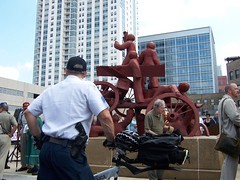 The American election results made the headlines in Mexico, even if US media have for the moment forgotten not only about Oaxaca, but the rest of the world as well. Cautiously welcoming the Democratic victory, Mexicans hope for a more nuanced, less strident discussion on immigration and "border security."
The American election results made the headlines in Mexico, even if US media have for the moment forgotten not only about Oaxaca, but the rest of the world as well. Cautiously welcoming the Democratic victory, Mexicans hope for a more nuanced, less strident discussion on immigration and "border security."No doubt there will be a change in tone from the US Congress. The Illinois Coalition for Immigrant and Refugee Rights (ICIRR), cheers the election as well, headlining: "IMMIGRATION FAILS AS WEDGE ISSUE FOR GOP" citing a survey of election results from Immigration 2006.
"Our preliminary analysis of last night’s results strongly suggest that very few toss up races were won by Republican candidates who attempted to exploit immigration as a voter motivator. Democrats that back comprehensive immigration reform mostly won their races. And the Republican Party is likely to get smaller as its hard line on immigration drives away Hispanic voters."A bit over optimistic to my way of thinking. But the new political landscape in Washington will make a difference. We will probably see the new leadership move to pass the previously-stalled "comprehensive" reform package that includes amnesty for some, deportation for more than a million, and a guest worker program that will cycle millions of disenfranchized workers in and out of the US economy. The guest worker program is favored by Bush and leading Dems (it is supported by SEIU, but opposed by AFL-CIO), so it's an obvious choice for those seeking to prove their bipartisan cred.
I am not so sure that guest workers will go down well with the American workers who just put the Dems in office, and that dynamic will be interesting to watch. Take a quick look at what union folks are complaining about at the Fox Valley Labor News: the spectre of a Canada-US-Mexico superstate that would throw out the US Constitution. This conspiracy theory is being pushed by a group of ultra-right wingers, and it came up among a group of Steelworkers I taught last summer.
If the Democratic leadership simply pushes the Kennedy immigration bill for swift passage, I think it will backfire. Instead, the Dems would be wise to foster an honest dialogue on immigration, free from the shrill racism, jingoism, and demogogery of the last few years. After that, maybe we can have new laws, new programs.
Back in Oaxaca, the fire burns on and Ulises Ruiz's hold on office gets more tenuous. No doubt he's just holding on until December 1st. If he resigns before then, there will be a new election--which the PRD will probably win. After December 1st, the PRI-PAN alliance can name a replacement.
There is a very nice analysis by Laura Carlson of the International Relation Center that takes in the whole situation and its relation to neoliberalism, free trade and globalization. This is one of those rare articles that is measured, historically informed, and forward looking. And this is what inspires the title of my post:
And why does this strike me so today? Because I'm reading James Green's excellent new book on nineteenth century American class society, Death in the Haymarket so I can teach it to a group of union leaders. (If you need a quick version of the Haymarket story, go to the Encyclopedia of Chicago). As a historian who lived in Chicago for five years, I have to admit I had grown a little tired of Haymarket. After a few hundred retellings, it gets old. But if it lost something in the telling, the story has always captured something visceral in me whenever I have encountered one of the spaces and memorials of the event.If the movement for global justice were a territorial battle, Oaxaca would be a tiny point on a very large map, of little consequence except to the people involved. But symbolic battles, although very real for the combatants themselves, are the true terrain of the movement for global justice. They offer an opportunity, even when lost, to defeat the myths that uphold the system.
Green sets the story of the bombing in Chicago's Haymarket Square on May 4, 1886, within a rich context of immigrant working class life and class warfare that took on an intensely personal character even as it symbolized wider struggles. The Chicago anarchists certainly understood the symbolic, and they saw themselves as part of a trans-Atlantic, if not quite global, movement. And ironically, over time the Chicago martyrs became much more known outside of the US than they were inside.

As Oaxaca is today, Chicago in 1886 was a local conflict on the cutting edge of "globalization." A very different form of globalization, and a different form of struggle, but both are local struggles with global symbolism.
In a sense, the two came together last May 1st when a huge march of immigrants--largely Mexicans and other Latin Americans marched through Haymarket Square. The new, powers-that-be-approved memorial wasn't the focus of the march, as it was of the CFL-sponsored labor day rally later the same day. But it was also more than just something passed along the way. The organizers clearly understood the symbolism of May 1st, and they chose their path to connect their struggle with the Chicago martyrs.
These are my rather jumbled thoughts on this, November 11, the anniversary of the hanging in Chicago of Albert Parsons, August Spies, Adolph Fischer, and George Engel in 1887.

No comments:
Post a Comment